MercoPress. South Atlantic News Agency
Tag: Argentine Central Bank
-
Wednesday, October 22nd 2025 - 10:08 UTC
Argentina: Dollar soars despite Central Bank and US Treasury interventions
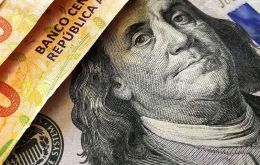
The Argentine financial market saw significant intervention by both the Argentine Central Bank (BCRA) and the US Treasury on Tuesday to prevent the wholesale dollar from piercing the ceiling of its official exchange band of AR$1,491. The BCRA sold US$45.5 million in reserves to cap the price.
-
Sunday, February 5th 2023 - 09:25 UTC
BCRA's REM report forecasts 2023 inflation in Argentina will reach 97.6%
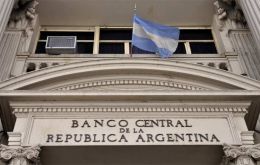
With a Consumer Price Index (CPI) for January 2023 expected at 5.6%, Argentina's Central Bank (BCRA) issued a report Friday forecasting that inflation for the entire year would be 97.6% while the country's Gross Domestic Product (the sum of all services and goods traded) will only grow by 0.5%.
-
Wednesday, July 27th 2022 - 09:40 UTC
Argentine Central Bank creates “agrodollar” to boost export liquidations

Argentina's monetary authorities Tuesday announced the creation of the “agrodollar,” a special exchange rate for agrifood exporters to liquidate their revenues through formal channels at an exchange rate closer to the parallel (“blue”) quotation.
-
Thursday, July 14th 2022 - 09:30 UTC
Argentina reshapes taxation to make up for gap between official and “blue” dollar
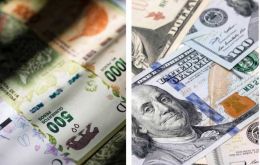
The Government of Argentina has adjusted the so-called PAIS tax from 35% to 45% as of Thursday to equate the exchange rate between the local currency and the US dollar to that existing in the unofficial “blue” market.
-
Saturday, April 10th 2021 - 10:53 UTC
Argentine inflation forecast at 46% for year 2021, 3.9% for March alone
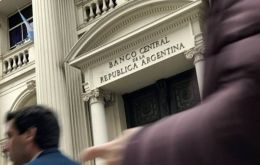
Argentina's Central Bank Friday announced the yearly inflation for 2021 was expected to reach 46%, while figures for the past month of March were around 3.9%. The official peso/US dollar exchange rate was foreseen at $ 115/ US$ 1 by the end of this year.
-
Saturday, October 24th 2020 - 08:55 UTC
Argentine bondholders claim government economic policies undermine investor confidence
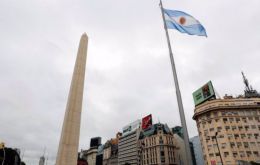
Argentine bondholder groups slammed the government over economic policies they said were undermining investor confidence in the country, which emerged from a sovereign default in September after a US$ 65 billion restructuring.
-
Friday, October 2nd 2020 - 09:01 UTC
Argentine central bank will promote Chinese Yuan for foreign trade negotiations
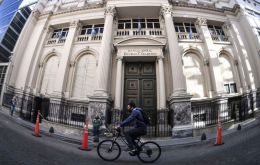
Argentina's central bank said on Thursday that it would allow a managed float of the peso currency and abandon its current “uniform daily devaluation” strategy as it seeks to adapt its monetary policy amid sharpening economic turmoil.
-
Wednesday, July 29th 2020 - 09:49 UTC
Money, money, Argentina importing banknotes and with the national mint working 24/7

Argentina is rushing to import banknotes as its national mint struggles to keep pace with soaring central bank issuance and inflation of more than 45%. The mint is importing printed bills for the first time in five years and is also boosting its purchases of the paper used to make banknotes, according to three people with direct knowledge of the matter.
-
Tuesday, September 24th 2019 - 09:53 UTC
Argentine biggest bondholders to meet with Treasury Secretary Lacunza
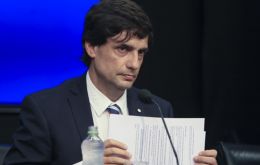
A group of Argentina’s biggest bondholders will meet with the country’s treasury minister in New York this Monday to hear how Latin America’s third-largest economy plans to dig itself out of its latest debt crisis.
-
Wednesday, August 14th 2019 - 09:08 UTC
What will be the IMF's reaction to the new Argentine political scenario?
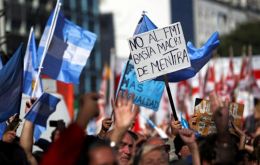
Argentina's peso slipped further against the dollar Tuesday while the stock market partially recovered as South America's third-largest economy continued to take a pummeling in the wake of pro-business President Mauricio Macri's crushing defeat in party primaries.
